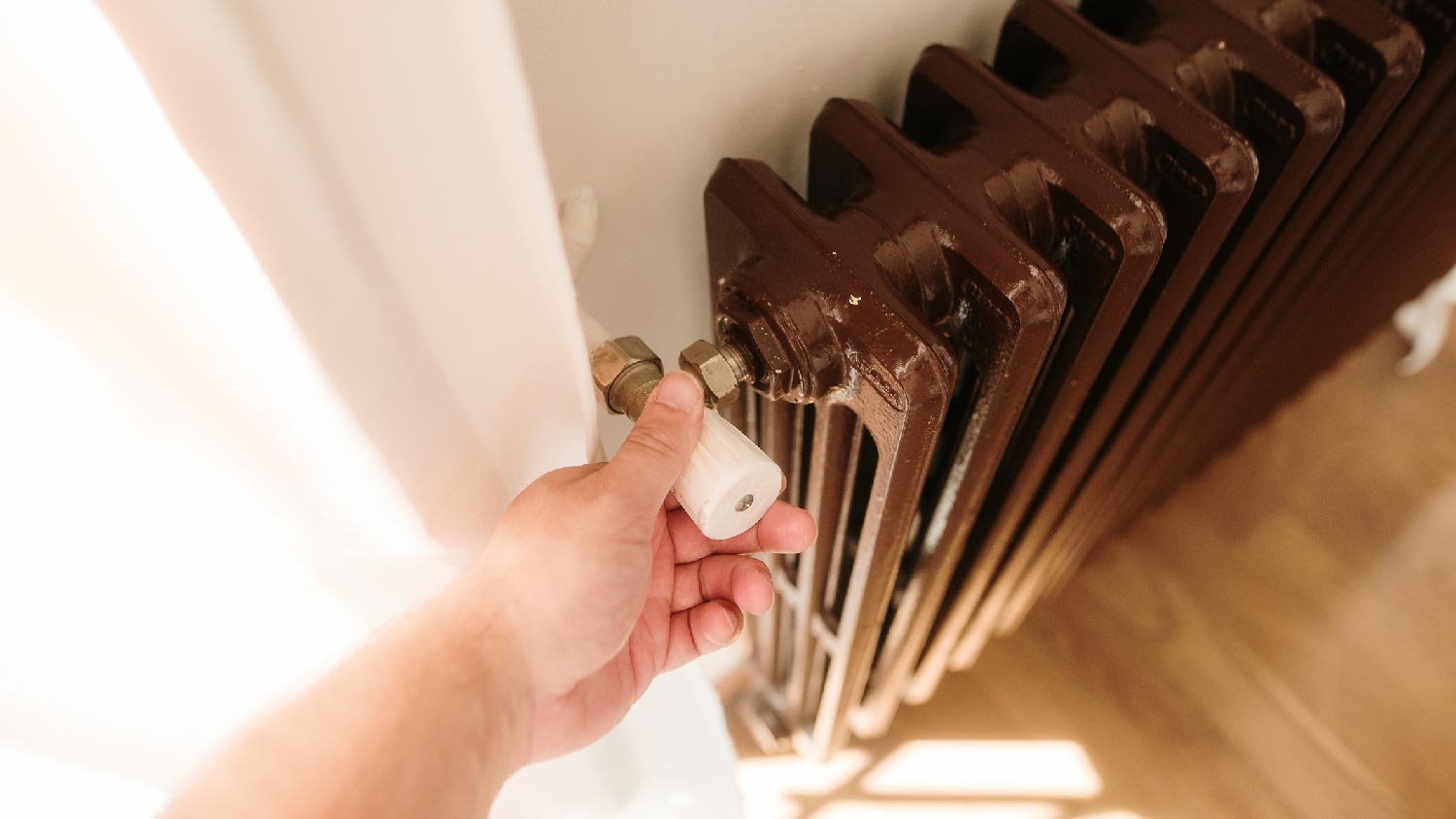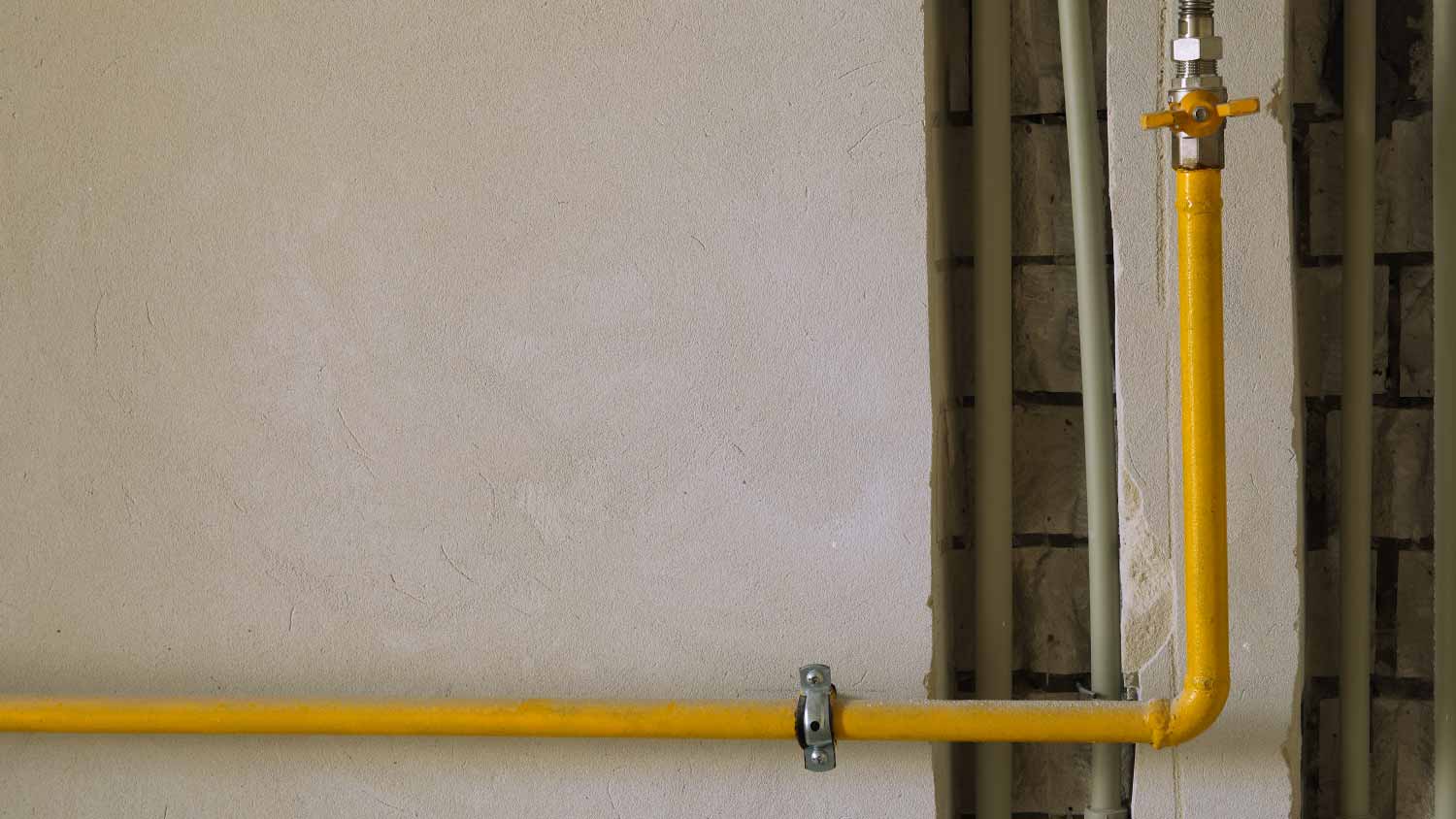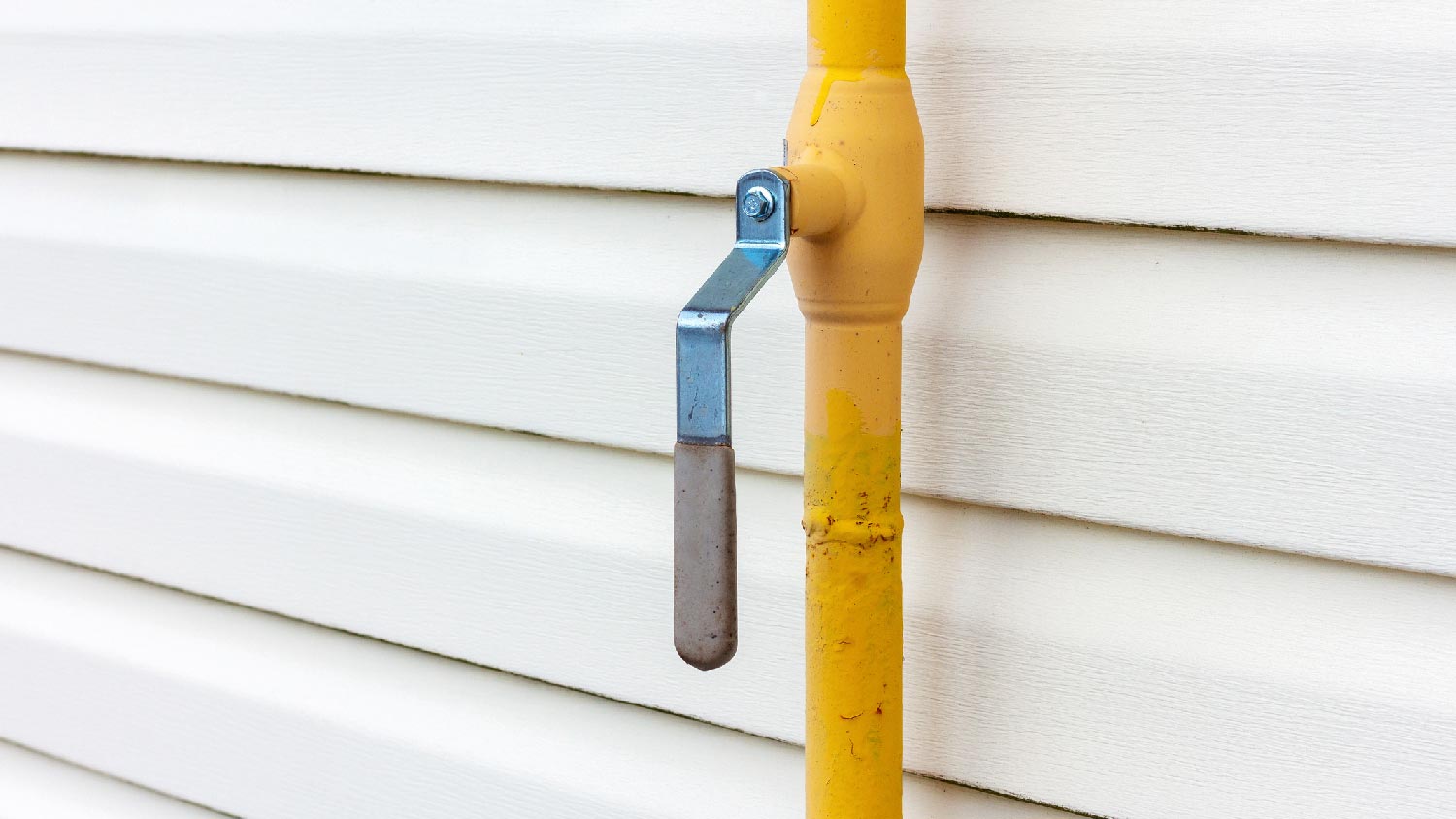
Whether it's time for pipe replacement or to hook up the range of your dreams, gas line installation cost is an important line in your budget. Let's take a look.
On average, repairing a gas line costs $598, but prices range from $271 to $936, depending on materials and pipe length. A gas plumber can estimate your costs.


The extent of the gas line damage heavily affects the final repair cost.
Inspecting and repairing a gas line is not a DIY project, and homeowners should call professionals as soon as they suspect an issue.
Gas system inspections start at $150, and repairs cost between $120 and $5,000.
Contractors may need to remove and replace drywall to access your gas line.
Schedule a gas line inspection once a year to avoid future issues.
The average gas line repair cost falls around $598, or about $15 to $25 per linear foot. This includes piping, materials, and $45 to $150 per hour to hire a master plumber or gas line specialist. Simple repairs start at $120, while major repairs like excavating a buried line cost up to $2,000 or more.
Gas leaks are a serious issue that should be handled immediately, so contact a professional as soon as possible. The following guide covers the cost factors involved in gas line repair.
Gas line repair costs range depending on the extent of the damage and the complexity of the repair. Here’s a breakdown of the various issues that can impact natural gas lines and the cost of having them repaired by a pro.
| Project Type | Average Cost Range |
|---|---|
| Repair gas leak | $120–$5,000 |
| Pressure test | $75–$500 |
| Damaged or corroded pipe | $6–$7 per linear foot |
| Cap a gas line | $75–$150 |
| Gas system inspection | $150 |
Gas leaks can be a serious health issue. Fixing a standard gas pipe leak will
cost $120 to $250, though you should plan for financial surprises. For example, if drywall is covering up a leaky gas pipe, you will have to hire a drywall contractor to replace the areas knocked out by the plumber. This will set you back $270 to $760.
If soil is covering the leak, a contractor will need to excavate the ground, and landscaping will be necessary after the job. This will cost $1,500 to $5,000.
If you suspect you have a gas leak, please do not hesitate to contact local authorities. Gas leaks can be hazardous and even fatal.
If you suspect a gas leak, a plumber will first conduct a pressure test. This is a relatively simple process that should cost $75 to $150 and take around 30 minutes to complete. However, some parts of the country will require a lengthier gas line pressure test that will take more than 24 hours and cost up to $500.
Gas pipes corrode over time or become damaged due to an earthquake. If this happens, you may have to have these pipes replaced. In some extreme cases, you may have to replace the entire system. A plumber will charge you the standard gas line installation price plus $6 to $7 per linear foot to remove the damaged piping.
Capping a gas line can be necessary if you are ending your gas service and switching to electric or if you want to cap off an unused section of piping to avoid leaks. This process should only take around 30 minutes and should cost you $75 to $150, though certain urban areas will see higher prices.
It’s a good idea to have your natural gas system professionally inspected every year. A pro will use this inspection to spot potential problems before they arise. For example, pipes can become weak over time, leading to eventual gas leaks. These plumbing inspections average $150.
Gas-powered appliances are popular due to their overall efficiency and quality. If you’ve ever waited impatiently for an electric stove to boil water, you know what we mean.
To experience the benefits of a gas-powered stove or related appliance, you may need to hire a natural gas plumber to run a line from the street to your home. There are multiple types of gas pipes to consider, each with its own use cases and cost per linear foot.
| Type of Pipe | Average Cost Range (Per Linear Foot) |
|---|---|
| Flexible corrugated stainless-steel tubing (CCST) | $2–$4 |
| Polyvinyl chloride (PVC) | $0.50–$1.50 |
| Galvanized steel | $3–$8 |
| Copper or brass | $1–$3 |
Flexible Corrugated Stainless-Steel Tubing (CCST): CCST runs throughout the home from the rigid piping source directly to the appliance. CCST piping costs $2–$4 per linear foot.
Polyvinyl Chloride (PVC) and High-Density Polyethylene (HDPE): PVC and HDPE tend to be found running underground from the street to the home and are great for low-pressure lines. This rigid piping is certainly on the budget-friendly side, at $0.50–$1.50 per linear foot.
Galvanized Steel and Black Iron: High-grade, multipurpose pipes found throughout the exterior and the interior of the home. They perform well for gas pressures of over 500 PSI. Installation tends to be labor-intensive, so count on spending $3–$8 per linear foot.
Copper and Brass: These pipes have long been used for plumbing and related tasks but have fallen out of favor in recent years due to increased regulations regarding their use for transporting gas. Your pro can help you decide what’s best. Copper and brass pipes cost $1–$3 per linear foot.
The repair method your contractor chooses will depend on the type and extent of the damage to the gas line. If the line is rusted, for instance, the contractor may use various methods, like sanding or a rust removal product. Other issues call for welding or pipe replacement. The method will directly impact the cost of gas line repair.
If you already have a gas line installed and run into an issue, you may need to hire a contractor to conduct repairs. The labor to install or repair gas lines costs between $45 and $200 per hour. Some licensed plumbers charge a set callout fee between $50 and $100. If the contractor charges per hour, the longer the job takes, the more you’ll pay in labor.
Your city or municipality will likely require a permit to start work on a gas line and then an inspection to ensure the work was completed correctly. Permit costs depend on where you live and your area’s requirements, but they average between $50 and $300. You can contact your permitting and inspection department to get an exact cost.
The cost to install or replace a gas line varies with where you live, so talk to a local contractor to get an accurate quote. Installing or repairing a gas line will be more expensive in urban areas due to population density and increased difficulty in excavating piping. Material availability, landscaping needs, and other factors also impact the overall cost. Here are some price estimates for several locations throughout the U.S.
| Location | Cost Range | Average Cost |
|---|---|---|
| Los Angeles, CA | $150–$3,000 | $975 |
| Portland, OR | $175–$1,200 | $625 |
| Minneapolis, MN | $100–$1,150 | $340 |
| Hartford, CT | $150–$1,200 | $475 |
| Chicago, IL | $125–$1,000 | $400 |
| San Francisco, CA | $200–$3,500 | $1,030 |
Additional repairs or services can add to the total cost of gas line repair. Here are a few potential repairs or services and their associated costs.
| Repair or Service | Average Cost |
|---|---|
| Install a new gas meter | $300–$600 |
| Gas shut-off valve | $300–$600 |
| Emergency repair | $200–$300 |
Working with gas can be very dangerous and even harmful to your health. Only attempt gas projects yourself if you have the experience and credentials to do so safely. Otherwise, let the professionals handle these jobs.
The best way to determine whether to repair or replace a gas line is to consult with your local natural gas plumber as this is not a DIY job. The contractor will be able to assess the damage to the gas line and recommend whether it makes sense to replace or repair it. You can ask for a cost estimate for both scenarios to help you make the final decision. In some cases—if the gas line is old or severely damaged—you may not have a choice and need to replace the line. For minor gas leaks, repairs might be the best and most cost-effective option.
If you hire a local natural gas plumber for this repair, you’ll spend money on labor, but it’s a small price compared to the potential hazards of DIY work. Improper handling of a gas line can lead to leaks, fire, explosions, or code violations, which could result in serious injury or costly damage to your property.
Gas line repair is a highly specialized and dangerous project. Consider these benefits of hiring a natural gas plumber to repair your line:
Gas professionals are trained to detect leaks safely and prevent explosions.
These specialized pros ensure repairs comply with local building codes and gas regulations.
Pros bring specialized tools and equipment so they can work with pressurized gas safely.
DIY mistakes can result in gas leaks, property damage, or personal injury—potentially costing thousands to fix and risking your long-term health.
Licensed gas technicians know how to work with meters, valves, and piping systems correctly.
Reputable gas line companies carry insurance and provide warranties for their work.
If you want to help with minor parts of the gas line repair, focus on smaller tasks, such as:
Clearing debris or obstacles from the work area
Ensuring pets and children are kept safely away
Moving furniture or outdoor items that may block access
Preparing documentation or utility information for the technician
Be ready to discuss with a pro the scope of the repair, including whether any sections of pipe, valves, or meters need replacement.
If budget allows, you can prepare to discuss additional safety upgrades, such as automatic shut-off valves or leak detectors.
Make sure to talk with your gas line pro about scheduling, permits, and inspection requirements, as these are essential for a safe and code-compliant repair.
Home is the most important place on earth, which is why Angi has helped more than 150 million homeowners transform their houses into homes they adore. To help homeowners with their next project, Angi provides readers with the most accurate cost data and upholds strict editorial standards. We’ve surveyed thousands of real Angi customers about their project costs to develop the pricing data you see, so you can make the best decisions for you and your home. We pair this data with research from reputable sources, including the U.S. Bureau of Labor Statistics, academic journals, market studies, and interviews with industry experts—all to ensure our prices reflect real-world projects.
Want to help us improve our cost data? Send us a recent project quote to [email protected]. Quotes and personal information will not be shared publicly.
From average costs to expert advice, get all the answers you need to get your job done.

Whether it's time for pipe replacement or to hook up the range of your dreams, gas line installation cost is an important line in your budget. Let's take a look.

As temperatures plummet, you know to keep an eye out for frozen water pipes, but can gas lines freeze? Find out the answer and how to prevent major problems.

Gas line connections need special sealants. So can you use Teflon tape on gas lines? Here, we explore the safest way to seal gas fittings.

Curious how deep gas lines are buried? We’ve unearthed the answer and the dirt on how far down those lines might be lying in wait.

Choosing the right pipe type for your gas lines can help ensure the safe use of your gas appliances. Find out if you can use galvanized pipe for gas in this guide.

Dangerous household gases can make you sick—and, in some cases, can be deadly. These are the five most common toxic household gases to be aware of.